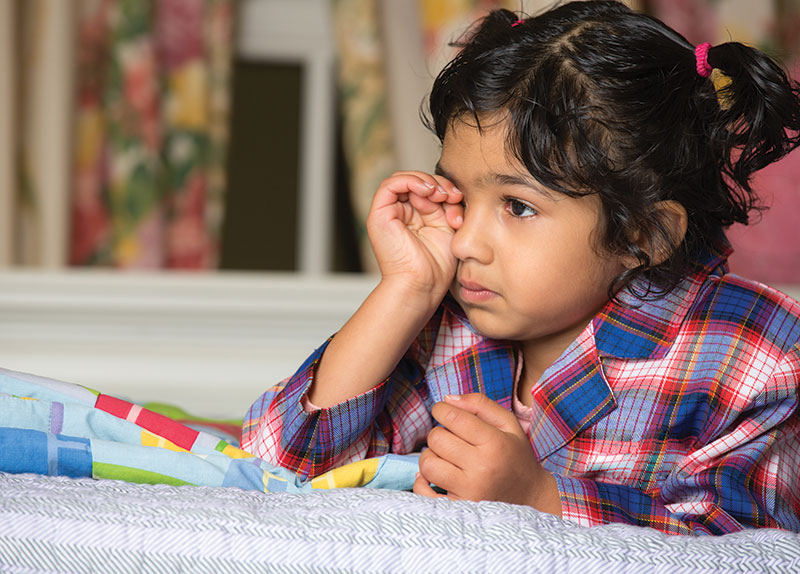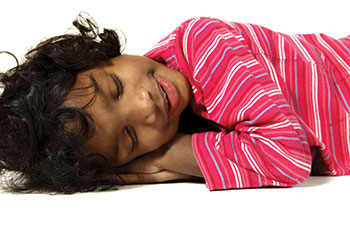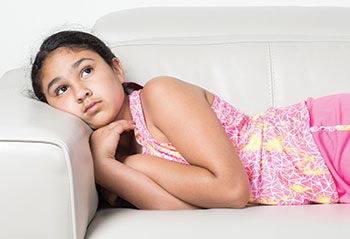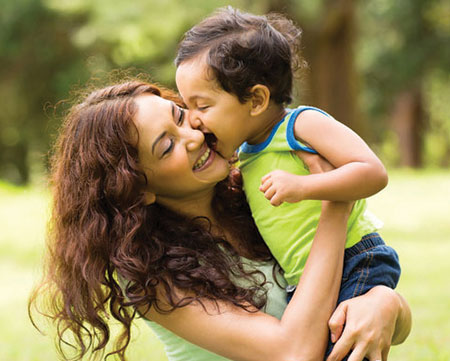Driven by pushy parents, millions of children and teenagers across the country are sacrificing sleep at the altar of academics, co-curricular and sports education, and technology obsession. The consequences are disastrous — poor academic performance, lethargy, irritation, incremental stress and infection-prone children – K.P. Malini, Cynthia John & Mini P.

Sleep deprivation is a new millennium lifestyle malady causing irreparable damage to children’s physical health and well-being. Driven by pushy parents, millions of children and teenagers across the country are sacrificing sleep at the altar of academics, co-curricular and sports education, and technology obsession. According to a research study published in October last year in The Indian Journal of Pediatrics (‘Sleep Pattern of Adolescents’ in a School in Delhi, India: Impact on their Mood and Academic Performance’), 90.5-92.5 percent of 13-15-year-olds in Delhi are sleep-deprived. The outcome is poor academic performance, lethargy, irritation and incremental stress among adolescents, says the study.
A case in point is 13-year-old Latha Murty, a class VII student of a top-ranked private school in Bangalore. Latha wakes up at 5 a.m on weekdays to reach her badminton coaching class at a sports centre 12 km from her apartment where she lives with her parents and younger brother. She practices badminton from 6-8 a.m and after a quick snack with her mother who brings her breakfast and lunch box, she dashes off to school which begins at 8.45 a.m. After a full school day, which finishes at 3.45 p.m, she rushes to an academic tutorials class between 4.30-7.00 p.m. Back home, she does homework and study. Her activities-packed day ends at 10.30 p.m when she retires to bed. Latha gets barely six hours of sleep everyday against the National Sleep Foundation, USA’s-recommended nine-11 hours for early teens.
 Unfortunately, there is widespread ignorance within the country’s parents community about the dangers of persistent sleep deprivation in children. Night sleep is not only a time for the body to relax, recuperate and renew energy, it’s also a period when the body performs important brain development and tissue repair functions. “Restful and adequate sleep is critically important for the physical and mental growth of children. It’s the time when the body heals and repairs, and crucial brain development occurs. As the maximum brain development happens in early childhood, young children need 11-13 hours of sleep per day. As they grow older, children and adolescents still need at least nine hours of sleep per day. Many studies have proven that sleep improves memory, recall, concentration and learning capabilities,” says Dr. Ranjini Raghavan, senior consultant ENT surgeon and sleep specialist at the Sunrise Hospital, Kakkanad (Kochi).
Unfortunately, there is widespread ignorance within the country’s parents community about the dangers of persistent sleep deprivation in children. Night sleep is not only a time for the body to relax, recuperate and renew energy, it’s also a period when the body performs important brain development and tissue repair functions. “Restful and adequate sleep is critically important for the physical and mental growth of children. It’s the time when the body heals and repairs, and crucial brain development occurs. As the maximum brain development happens in early childhood, young children need 11-13 hours of sleep per day. As they grow older, children and adolescents still need at least nine hours of sleep per day. Many studies have proven that sleep improves memory, recall, concentration and learning capabilities,” says Dr. Ranjini Raghavan, senior consultant ENT surgeon and sleep specialist at the Sunrise Hospital, Kakkanad (Kochi).
Sleep deficit consequences
The adverse consequences of children suffering prolonged sleep deprivation are numerous. Among them:
Increased body fat and poor immunity. The hormone leptin is secreted by the body’s fat cells during sleep. Lack of adequate sleep reduces the time available for the release of this hormone, prompting children to crave high-fat and carbohydrate-rich foods. The body also produces a protein — cytokines — which prevents infections, illness and stress, as children sleep. Decreased cytokines renders children vulnerable to viral and other infections.
Obesity. Children and adolescents who get less than recommended sleep for their age are also at higher risk of developing obesity, says a 2018 study conducted by researchers at the University of Warwick, UK. The findings of the study indicate that sleep may be “an important potentially modifiable risk factor (or marker) of future obesity”.
“Every infant should have a specific amount of REM (rapid eye movement) or deep sleep with dreaming and bodily movement, faster pulse and breathing along with non-REM sleep. An infant who doesn’t get enough of both, tends to be cranky, making her ingest more milk, whether through breastfeeding or bottle-feeding, to soothe herself. This leads to obesity, even in infancy. Being overweight can lead to cardiovascular diseases and Type 2 diabetes which is also on the increase in children,” says Dr. Charu Kalra, paediatrician and researcher at Warwick University.
Growth. Growth hormones are secreted mainly during deep sleep. Chronic sleep deprivation can result in children not attaning their full height potential.
Diabetes/cardiovascular diseases. Blood glucose and cortisol levels which are linked to diabetes, obesity and heart diseases, increase when children don’t get enough sleep. According to the US-based National Sleep Foundation, adolescents who don’t sleep well are at greater risk of developing cardiovascular problems, indicate higher cholesterol levels, higher body mass index, larger waist sizes, high blood pressure, and are at higher risk of developing hypertension.
Cognitive impairment. The development of cognitive capabilities, knowledge retention and concentration is  adversely affected by inadequate slumber. Too many parents push children into sacrificing sleep for tuition and exams preparation. “Increasingly, success in school-leaving board exams is becoming the passport to career progression. Preparations for exams start at ever younger ages these days, with children spending long hours in tutorials, coaching centres and back-to-back classes. In between, they also have homework to complete. Therefore, anxious parents tend to reduce children’s sleeping hours. This is dangerous as inadequate sleep results in bad health and impairs rather than improves children’s academic performance,” says Dr. Gita Mathai, a Vellore-based paediatrician and columnist of ParentsWorld.
adversely affected by inadequate slumber. Too many parents push children into sacrificing sleep for tuition and exams preparation. “Increasingly, success in school-leaving board exams is becoming the passport to career progression. Preparations for exams start at ever younger ages these days, with children spending long hours in tutorials, coaching centres and back-to-back classes. In between, they also have homework to complete. Therefore, anxious parents tend to reduce children’s sleeping hours. This is dangerous as inadequate sleep results in bad health and impairs rather than improves children’s academic performance,” says Dr. Gita Mathai, a Vellore-based paediatrician and columnist of ParentsWorld.
Behavioural problems. Moreover, many parents fail to discern the correlation between chronic sleep deprivation in children and behavioural changes. A study conducted in 2016 by the University of Houston, USA, indicates that children who experience inadequate or disrupted sleep are more likely to develop depression and anxiety disorders later in life. Dr. Ranjini Raghavan, sleep disorder specialist at Sunrise Hospital, Kochi concurs. “The adverse effects of sleep deprivation are hyperactivity, reduced concentration, behavioural problems, anxiety, aggression and irritability. If chronic sleep deprivation continues into adolescence, it can lead to depression and obesity,” she warns.
 Interestingly, other studies reveal that school-going children from high-income households are at greater risk of sleep deprivation. A study titled ‘Socio-Economic Status, Time Spending, and Sleep Duration in Indian Children and Adolescents’ published in the Journal of Child and Family Studies (January 2017), found that high socio-economic status (SES) children reported almost 90 minutes less sleep per day than children of lowest SES families. Moreover, lower SES children reported greater physical activity, while affluent children averaged more time on academic work which the study found to be a strong predictor of lesser sleep duration. According to the study, the consequences of insufficient sleep include poor scores in cognitive tasks, depression and greater propensity for self-harm and even suicide.
Interestingly, other studies reveal that school-going children from high-income households are at greater risk of sleep deprivation. A study titled ‘Socio-Economic Status, Time Spending, and Sleep Duration in Indian Children and Adolescents’ published in the Journal of Child and Family Studies (January 2017), found that high socio-economic status (SES) children reported almost 90 minutes less sleep per day than children of lowest SES families. Moreover, lower SES children reported greater physical activity, while affluent children averaged more time on academic work which the study found to be a strong predictor of lesser sleep duration. According to the study, the consequences of insufficient sleep include poor scores in cognitive tasks, depression and greater propensity for self-harm and even suicide.
Though some argue that too much sleep is waste of precious productive hours, the consensus of opinion among medical experts, researchers and psychologists is that young children, adolescents as well as adults need sufficient restful sleep to give their best at school, college and workplaces. In particular, within growing children and adolescents, adequate sleep is associated with several crucial and essential body restorative changes and physical development. Therefore, parents should exercise care not to allow sleep sacrifice in the pursuit of academics, co-curricular and sports excellence. Instead of success and improved performance, prolonged sleep deprivation can make children vulnerable to frequent infections and poor learning outcomes.
How much sleep does a child need?
According to a study published in The Journal of Global Health (July 2019) titled, ‘Sleeping patterns of Indian children’, night sleep duration is the lowest among Indian children compared to the 13 nations (the US, UK, and  China) studied. Moreover Indian children go to bed comparatively late and consequently their sleep inadequacy over the long term is severe.
China) studied. Moreover Indian children go to bed comparatively late and consequently their sleep inadequacy over the long term is severe.
The National Sleep Foundation, a US-based non-profit committed to researching and promoting sleep health, recommends the following sleep duration per 24-hour day for different age groups:
• Newborns (0-3 months): 14-17 hours of sleep
• Infants (4-11 months): 12-15 hours
• Toddlers (1-2 years): 11-14 hours
• Preschoolers (3-5): 10-13 hours
• School age children (6-13): 9-11 hours
• Teens (14-17): 8-10 hours
• Young adults (18-25): 7-9 hours
Improving children’s sleep habits
 Children may be reluctant to sleep for any one or more of the following reasons:
Children may be reluctant to sleep for any one or more of the following reasons:
» They may be too tired or not tired enough
» Don’t want to leave a scene of excitement
» It’s a form of rebellion to assert independence
» Anxiety and fear of sleeping alone
» Lack of self-soothing skills, or information on how to manage boredom
» Emotional deprivation. Toddlers respond better at bedtime if parents are available physically and emotionally during the day and at bedtime. If parents are busy watching television or entertaining guests at bedtime, children may experience neglect and try to draw attention by throwing tantrums.
Some ways to promote healthy sleep habits in children
Ban all digital gadgets half an hour prior to bedtime. The blue light emitted by cell phones, computers, tablets, and television sets reduces the production of melatonin, the hormone that controls the sleep/wake cycle or circadian rhythm. Reduced melatonin production makes it harder to fall and remain asleep. Therefore it’s advisable that children have at least 30 minutes of gadget-free transition time before getting into bed. Even better: Make the child’s bedroom a technology-free zone — remove television sets and all other electronic devices.
Introduce bedtime routine and rituals. Ensure your child sleeps and wakes up at the same time during the school term and holidays. Children mentally associate predictable bedtime rituals with restfulness. Get her to put her toys away, give her a warm bath, brush her teeth, wear her pajamas and settle down to listen to a bedtime story. A set routine signals her mind and body that it’s time to wind down.
A 2017 study published in Sleep Medicine Reviews titled ‘Benefits of a bedtime routine in young children: Sleep, development, and beyond’ says that a nightly bedtime routine promotes deep sleep as well as overall development and well-being in early childhood. The recommended bedtime routine includes activities in the area of nutrition (a warm glass of milk), hygiene (bathing, oral care), communication (reading, singing lullabies) and physical contact (massage, cuddling and rocking). “Since such routines embody nurturing care, they promote language development, literacy, child emotional and behavioural regulation, parent-child attachment and improved family functioning,” says the study.
Exercise and physical activity. If children are physically active, a good night’s sleep will follow. Physical activity is not necessarily synonymous with organised sports and games. Running, cycling, swimming for 45-60 minutes or 15 minutes of climbing stairs continuously provides the physical fatigue necessary for deep sleep.
Give your child a choice. A probable reason why young children don’t fall asleep easily is because they want to be in control. So, let your child be in control in some ways. Let her choose the night dress to wear or pick the stuffed animal she will cuddle in bed. Get her to choose the story you read to her. This will put her in a good mood. Make bedtime a positive experience by letting the routine include what your child enjoys, whether it’s a tummy rub, a favourite book or splashing in the bath.
Provide a cosy sleep environment. Make the sleep area dark, cool and comfortable. If your child is afraid of the dark, leave a low-voltage light on. Give her a heavy blanket as the extra pressure will relax her and induce a feeling of calm.
Play soothing music. You could sing a lullaby, if you are so inclined. Or, play calming music, preferably the same tunes every night so that your child will associate the music with sleep.
Set an example. Get off your own mobile and other screens at least two hours before bedtime, and go to sleep at a regular time — your children will learn and emulate your sleep habits.
Ban caffeinated beverages (coffee, tea, aerated drinks, energy drinks like Red Bull) for children below 16 years of age.
Sleep help aids
The global revenue of the sleep aids market — comprising drugs, medical devices and the mattress industry — is estimated to rise to $79.85 billion (Rs.548,652 crore) by 2023, registering a growth of 7 percent from 2017 to 2023.
Within this market, the mattress industry is the prime beneficiary. Foam, traditional coil, pillow-top, hypo-allergenic, adjustable, and visco-elastic ‘memory’ foams are a few of the types of mattress products which promise to improve the quality of sleep. PW lists four sleep-friendly mattresses available in India.
• SleepyCat, a Mumbai-based company, manufactures orthopedic mattresses with cooling crystals inserted into the memory foam to regulate body temperature and improve sleep.
• Wink & Nod mattresses are made of bamboo fabric and remain cool for long periods of time.
• Cuddl offers pillows with adjustable thickness to suit individual needs.
• Wakefit offers orthopaedic mattresses made of memory foam, spring and coir, that provide optimal body support and promote deep sleep.
Apps


 Several apps promise to promote deep sleep in children. Among them:
Several apps promise to promote deep sleep in children. Among them:
Lullaby for Babies. The prerecorded lullabies of this app include classics such as, Hush, Little Baby and soothe infants into sleep. (Free; Android)
Lightning Bug — Sleep Clock. 200 sound loops — from rainstorms and waves to electronic instruments — that induce infants to sleep. Moreover it has a white-noise mixer that prevents parents from falling asleep while the baby’s still awake. (Free; Android)
Sleepy Sounds. Displays soothing animation to replicate a calming night-light. You can also record your own music and sounds. (Free, iPhone and Android)



























